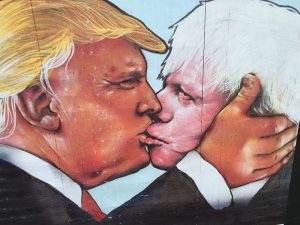
Source: Matt Brown, CC-BY 2.0, via Wikimedia Commons
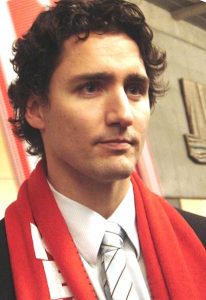 Working, poor, and young people throughout the West are on the verge of political revolution – a veritable Western Spring. This is manifest in vastly differing manners – from Trump, La Pen, & Farage; to Bernie, Trudeau, & Corbyn. Political establishments throughout the West are, of course, reacting in the least productive manners imaginable. Thus, the shared frustrations of increasingly disenfranchised peoples are magnified and accelerated by corrupt, rigged and (seemingly at best) unresponsive governments. People have differing views on the causes, and thus solutions, to these maladies. And prerequisite to bringing honest and fair public policy debates before our respective populi are reform and the unrigging of our universally corrupted political and electoral systems.
Working, poor, and young people throughout the West are on the verge of political revolution – a veritable Western Spring. This is manifest in vastly differing manners – from Trump, La Pen, & Farage; to Bernie, Trudeau, & Corbyn. Political establishments throughout the West are, of course, reacting in the least productive manners imaginable. Thus, the shared frustrations of increasingly disenfranchised peoples are magnified and accelerated by corrupt, rigged and (seemingly at best) unresponsive governments. People have differing views on the causes, and thus solutions, to these maladies. And prerequisite to bringing honest and fair public policy debates before our respective populi are reform and the unrigging of our universally corrupted political and electoral systems.
The initial steps for any individual are to educate yourself and to vote. And not just for president. Presidents aren’t dictators, so simply voting every four years just isn’t enough. Elections with the most impact on our daily lives are at the local level – our school boards, city councils, state legislatures. They decide your property taxes; your jurisdiction’s reliance upon seemingly-omnipresent fees (rhetorical non-taxes for message-conscious politicians; whether potholes are filled; how many kids are in the classroom; how fast emergency personnel are able to respond; whether revenue conversely serves to fund tax cuts for corporations and the wealthy… More influential than general elections are primaries. And elections – though they occur somewhere in America seemingly every Tuesday – are but dipping ones’ proverbial toe into the political process.

Congressman turned lobbyist Dick Armey Source: CC-BY, US Congress
Wealthy campaign donors and paid lobbyists have members of congress at beckoned call. They also need to hear how their constituents feel and what they desire. They need to hear the struggles and concerns of regular people.

Source: CC-BY, Associated Press
Call your representatives. Don’t get nervous – you’ll likely never speak to them directly (unless you’re persistent, and please do). You simply tell their assistant your name (or the voicemail of their assistant, keep trying), whereabouts you reside (be specific as you like), and what issue or piece of legislation you wish them to support or oppose. If they refuse the will of their constituents: petitions, letters to the editor, click-tivism, support primary competitors, canvass & phone bank, peacefully protest, practice civil disobedience when necessary.
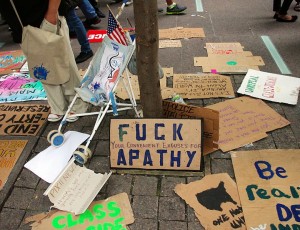 Unfortunately – and until we unrig and reform our political and electoral systems – just getting people to care enough to vote, let alone risk arrest…
Unfortunately – and until we unrig and reform our political and electoral systems – just getting people to care enough to vote, let alone risk arrest…
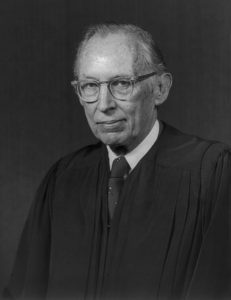
Lewis Powell Source: CC-BY, Library of Congress
Money is the root of all evil. And political bribery is as old as governance itself. But in America we’ve essentially legalized the practice. (Which monetarily-incentivized corporate media has embraced and legitimized, casting the most successful fund-raisers as best qualified for office.) Our Supreme Court has determined – just in the past forty years – that corporations are people and money is speech (which just so happens to coincide with an era of wage-stagnation). According to this relatively recent Supreme Court precedent, corporations and the wealthy have the constitutionally protected free speech rights to lavish politicians with “donations” (Buckley, Bellotti). They’ve declared that there is not even so much as an appearance of corruption in legal bribery, specifically unlimited and secret dark-money (Citizens United). They’ve set the judicial precedent that quid pro quo is insufficient evidence of corruption (Bob McDonnell).
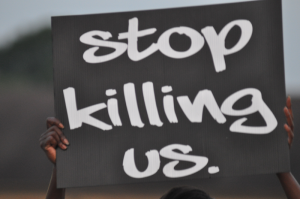 Sane people find these sorts of things to be somewhere on the scale between ridiculous and vomitous. And it speaks to the mistrust we rightly have in our supposedly representative governments.
Sane people find these sorts of things to be somewhere on the scale between ridiculous and vomitous. And it speaks to the mistrust we rightly have in our supposedly representative governments.
But voting for Trump, or Bernie, or whoever else can’t fix these unfortunate realities alone (unless you count waiting for justices to die and hoping their replacements vote correctly on an eventual case). The POTUS doesn’t get to overrule the SCOTUS, and only some even have the opportunity (however macabre) to shape it, which leaves the matter still to the whims of nine, fallible human beings.
 The only way to concretely overrule the SCOTUS is by amending the US Constitution – which every generation of Americans has done, and which our founding fathers fully expected of us. They inserted the initial ten themselves, and included multiple routes to do likewise.
The only way to concretely overrule the SCOTUS is by amending the US Constitution – which every generation of Americans has done, and which our founding fathers fully expected of us. They inserted the initial ten themselves, and included multiple routes to do likewise.
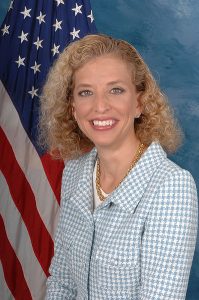
Debbie Wasserman Schultz Source: CC-BY, US Congress
Congress could conceivably come together and call for a constitutional convention for an amendment to get money out of politics. But people who’ve thrived under a given system are unlikely to want to change its rules – especially when there is financial incentive for inaction.
Fortunately, the states were afforded by our forefathers the ability, and when necessary the responsibility, to call for a convention. And must ratify any proposed amendment, no matter the origin.

Cenk Uygur Source: CC-BY, Ocaasi
The 28th Amendment for Free & Fair Elections will ban political bribery on behalf of corporations, unions, special interest groups – all of it. That way, our elected officials will be accountable to their constituents – the voters – rather than the sponsors who fund their (re)election campaigns. A recent Princeton study going back to the 1970s showed that the will of the people has essentially zero correlation with public policy, unless the wealthy happen to agree with the general public. That’s not democracy. That’s oligarchy.
While the specifics are not always clear, and require the luxury of time to research, the vast majority of people have a sense that vast economic distress is the doing of the wealthy using corrupt politicians and governments to extract more and more for themselves.
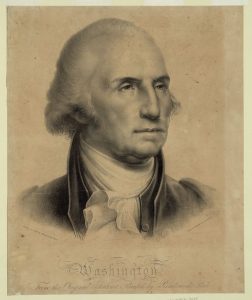 Once we achieve reform demanding that the decisions of the people determining our economic (foreign, immigration…) policies are based upon how the people will be affected rather than just their corporate sponsors, we will have regained control of our government. Revolution. Without a single shot fired. Our founding fathers were both brave enough to take up arms for liberty & freedom and wise enough to ensure that we wouldn’t have to.
Once we achieve reform demanding that the decisions of the people determining our economic (foreign, immigration…) policies are based upon how the people will be affected rather than just their corporate sponsors, we will have regained control of our government. Revolution. Without a single shot fired. Our founding fathers were both brave enough to take up arms for liberty & freedom and wise enough to ensure that we wouldn’t have to.
The amendment is the tallest and utmost hurdle. And but the beginning. That’s just to get money out of politics. The obvious question is how else, exactly, political campaigns should be funded. Many people want a reasonable cap on personal donations, with the government matching those funds. We could give a credit to each voting-age citizen that could be transferred to their preferred candidate. We could eliminate the practice entirely with publicly funded elections.
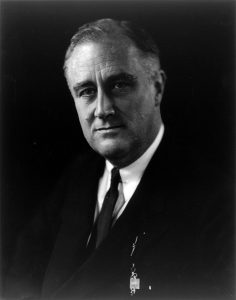
FDR, four-term liberal president Source: CC-BY, Elias Goldensky
And suddenly…I’ve got a hard on. We’re talking about how to best shape a government that will best represent its people. There are good ideas and bad, of course. Some people think we should pay members of congress the minimum wage; or withhold their pay should they fail to pass a budget – I say we should pay them more, not less, in order to better attract talented individuals to public service. Many people are in favor of term-limits – I think the people should be able to elect whomever they want to represent them, so long as the electoral system is fair.
Our current system is profoundly and openly unfair (fair is a place they judge pigs & pumpkins, but I digress).
Given the electoral college system, my vote for president is basically worthless. Ohio, Florida, Pennsylvania, Virginia, Colorado… There are but a handful of swing-states, and those are essentially the only places where individual Americans have even a modicum of a say in who will be their president (choosing between vetted-by-billionaire lesser-evils). We could switch to a popular vote – but then candidates would mainly cater to areas where voters are concentrated like California & New York (which could conceivably leave them vulnerable to rural-focused candidates #sideeffects).

Dr. Jill Stein, Green Party presidential nominee, Source: CC-BY, RAHurd
The presidential debates system is rigged – the two major-party candidates have their respective places reserved, but 15% support is required before people are exposed to the ideas of third-party candidates (Jill Stein and Gary Johnson, currently).
There are no national standards for who gets to be on the ballot. Some states just want cash for a spot – as little as a couple hundred bucks. Some states require hundreds of confirmed signatures of registered voters from every county – which requires significant resources and name recognition.

Populist turned sellout super-delegate Gov. Howard Dean, Source: CC-BY, Elliot Munoz
There are no national standards for selecting a nominee. The political parties control the nomination processes. The parties decide how many debates to hold (and bar candidates from participated in unsanctioned debated), and the standard for which candidates’ ideas are granted access to that megaphone (see Rand Paul, Lawrence Lessig).
The parties decide whether there are unbound delegates, or unpledged (super) delegates – both of whom serve as establishment fail-safes, just in case the people get behind a populist fringe candidate.
States decide whether to hold primaries or caucuses (caucuses are fundamentally unfair to working people). State parties decide whether to hold open, mixed, or closed primaries (closed & mixed are unfair to independent or unaffiliated voters, in addition to those same populist or fringe candidates). State party (and precinct) chairs determine the rules (or at minimum control the processes for adopting rules) at caucuses. Elections officials decide how many polling stations to open, and whether people in line at closing of the polls still get to vote; how long before the election you must’ve registered; whether to hold recounts in close or challenged elections (short of a lawsuit).
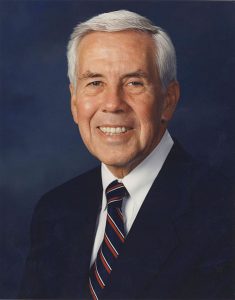
Primaried Republican Senator Dick Lugar, Source: CC-BY, US Senate
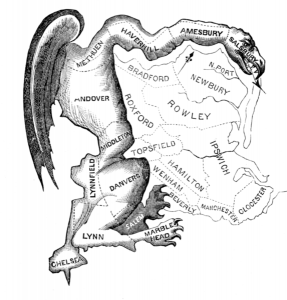
Source: CC-BY, Boston Centinel
By gerrymandering districts (every ten years following the census), politicians get to pick their voters. They stack & pack the electorate to their benefit – rounding like-minded voters into noncompetitive, incumbency-protecting safe districts – where the only threat of losing office is being primaried by someone further to the political extreme. This not only results in more extreme politicians, but increasingly extreme voters and political parties. Arizona, California, & Washington have created non-partisan redistricting commissions. We could easily use computer programs to draw unbiased boundaries and end the uniquely American practice of Gerrymandering.
Politicians in decide whether you get to vote if you have a felony (and decide which felonies are disqualifying, if any). Elections officials can purge your name from the rolls if you haven’t recently voted, or if they think you are a felon, or think you died, or think you moved, often because you have a common or similar name (Williams, Jackson, Hernandez, Ramirez, Mohammed, Abdul, Lee, Kim – see how that works?).
Your vote could be challenged at the polling station by a campaign operative (you’d be given a provisional ballot). Poll workers may give you a provisional ballot because your voter registration shows a maiden name or middle initial but your ID doesn’t, or you’re a student with an out-of-state ID and they don’t accept student IDs, or you went to the wrong polling station and it’s too late, or you were purged from the rolls, or your party affiliation had been changed. Provisional ballots are only counted under very rare circumstances. Never, ever settle for a provisional ballot (search the number for a voter-support line if you have problems).
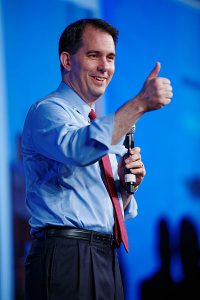
Voter-ID law proponent Gov Scott Walker, Source: CC-BY, Michael Vadon
Voter-ID laws could mean that you can’t vote because you can’t afford a car (have direct deposit) and don’t have a license. Or you are already registered to vote, but can’t get a current ID because you don’t have a birth certificate, or you don’t have the resources to make the trip to your home state to get a birth certificate, or your birth certificate shows your maiden name and not your registration, or there is no place in your county to get an ID (which costs money, and time off from work, and transportation ie poll tax).

Last of his kind, investigative reporter Greg Palast, Source, CC-BY, Zdroberts
Your mail-in ballot could be misplaced and you’d never know it. Your ballot could be cast on an old or untested machine which could be, unbeknownst to you, owned by a company associated with a particular candidate or campaign. We could vote online, but that could be hacked. As has been said (and often attributed to Stalin): It is not the people who vote that counts. It is the people who count the votes.
There are myriad obstacles to the franchise; numerous ways in which the system is rigged at seemingly every level. We must do everything possible to get people involved and educate them on how to reform our political and electoral systems so that politicians who refuse to abide the will of the people are removed and replaced. So that those with the privilege of being afforded positions of power understand that their primary task is to ensure that public policy benefit the public.
Voting should be a right, not a privilege. We could have a holiday for voting so that more people are able to participate. We should have at least two days, because some jobs can’t go offline (9-1-1, fire departments, healthcare workers, prison guards, bus drivers, gas stations…).
We could have motor-voter laws which automatically register people to vote when they get their license. We could have opt-out voter registration of all citizens upon their eighteenth birthday (or sixteenth, but that’s another matter). We could have same-day registration so it wouldn’t matter what party you were listed under or for how long. We should have compulsory voting. We could employ the carrot method: increasing tax credits for voting in presidential elections on down; more for primaries, mid-term, and off-year elections.
We could have top-two (aka jungle) primaries. We could have ranked-choice voting. We should have a None of the Above option on ballots.
What we cannot have, and what we mustn’t continue, is this vicious cycle. Our elected officials and our institutions have earned mistrust and cynicism. Wealth inequality is the worst since the Gilded Age. Statistically, the average member of congress is now a millionaire. Congress as a whole maintains worse approval ratings than lice. We are showing up to the polls at the lowest levels since WWII.
If a politicians knows that there is 0% chance that you will vote for them, they have zero reason to care how you feel. They instead use public policy to cater to wealthy campaign donors who’ve been unburdened of the normal consequences of bribery. Which breeds even more regressive, supply-side economic policy and austerity (and wars for profit, and prisons for profit…). Which increases socioeconomic inequity and immobility, and yet more public mistrust in government. And so goes the downward spiral.
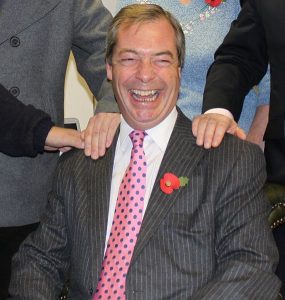
 And the inevitable yet unpredictable backlash. The Trump. The Bernie. The Corbyn. The Brexit. Eliciting the wringing of un-calloused hands. Birthing plots of witless opulents to undermine the will of exasperated peoples. And calls (echoed by a complicit commentariat) for less democracy – for establishment fail-safes and referendum do-overs – to keep the unwashed masses from having a say in their own, supposedly self-governments. To breed yet more mistrust. Spiraling, spiraling.
And the inevitable yet unpredictable backlash. The Trump. The Bernie. The Corbyn. The Brexit. Eliciting the wringing of un-calloused hands. Birthing plots of witless opulents to undermine the will of exasperated peoples. And calls (echoed by a complicit commentariat) for less democracy – for establishment fail-safes and referendum do-overs – to keep the unwashed masses from having a say in their own, supposedly self-governments. To breed yet more mistrust. Spiraling, spiraling.
We are fast-approaching an inevitable rebirth. Either we continue down the current trajectory and become a society with a tiny class of oligarchs brooding over masses of politically & economically repressed worker-subjects – which would result in pitch fork-wielding hordes storming the Hamptons. Or, establishmentarian neoliberal so-called elites will submit to a peaceful people’s political revolution. To reform political and electoral systems. To restore the American Dream. And embrace the awakening of the Western Spring.
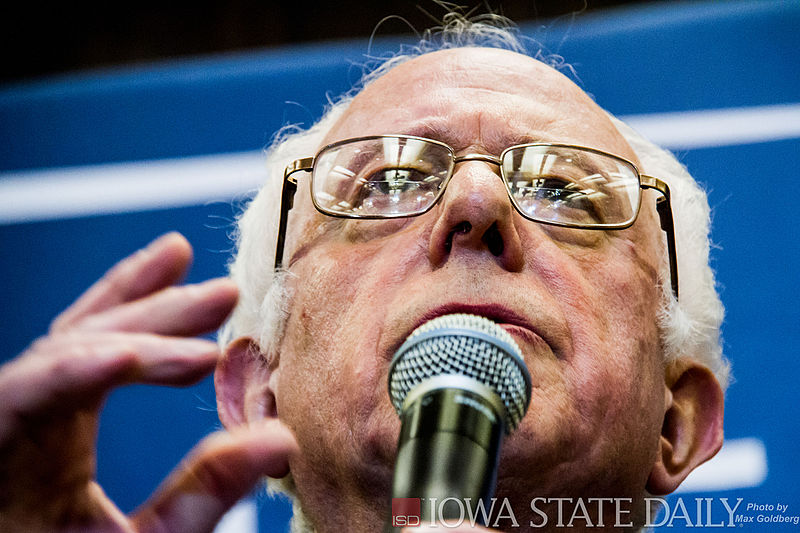
You are so awesome! I do not suopose I have read through
a single thing like that before. So nice to find somebody with some genuine thouughts onn this
subject. Seriously.. thank you for starting this up. This site is something that’s needed
onn the internet, someone with a bit oof originality!
You really make it appear so easy with your presentation however
I to find this matter to be really something that I feel I
might never understand. It sort of feels too complex and extremely vast for me.
I am having a look ahead in your next put up, I’ll attempt to get the grasp of it!
Good blog post. I definitely appreciate this website. Keep writing!